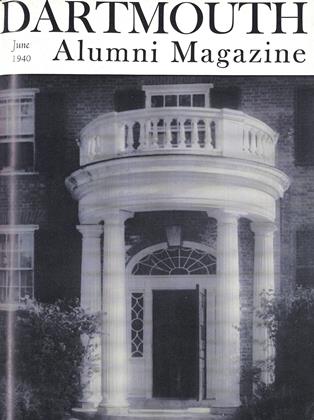GORDON FERRIE HULL may cast a reflective glance backward this month when he marks his last exams for Physics 4, turns in grades for the last time to Registrar Conant, and carries a baton as an honorary marshal of the Alumni Procession from the campus to the gym on June 15. There will be too many other things on his active, vigorous mind to make the backward look more than a brief glance. In that moment of retirement from classroom work Mr. Hull should feel deeply and genuinely satisfied with the 41 years of his Dartmouth teaching career. The chances are he will never stop teaching, whether showing a simple experiment to Hanover 12-year-olds or demonstrating complexities to his colleagues in Physics. The facts are that at three-score-and-ten he's in fine fettle and can look forward, not backward.
One can not imagine Gordon Ferrie Hull in anything except fine fettle. Your picture of him of 10 or 20 years ago is correct today—keen eyes, head cocked a bit as a trigger ready to release a potent missile, eager, ready for a friendly conversation or a sharp debate. His faultless memory is a legend. A recent set of twins in his large elementary course report that he looked the class over carefully the first day it met. At the next exercise one of the twins was absent. The other (and they embarrassed their best friends by looking so much alike) replied "Present!" when Professor Hull announced his name as absent. "You have got me mixed up with my absent brother, sir," said the twin who was present, "I am John G. Smith." "Are you sure?" asked Mr. Hull.
Our appreciation to Professor Stearns Morse for his biographical profile of Gordon Ferrie Hull in this issue of the ALUMNI MAGAZINE.
A NOTHER RETIREMENT from active teaching this month is that of Professor William Geiger '92. He has taught education at Dartmouth for nine years and was for most of his notable career head of the public schools in Tacoma, Wash. "Bill" and Mrs. Geiger have bought a farm up in Lyme. After retirement they will "farm it" mildly and be near enough Hanover and the College to see the people and things they love. For how many Dartmouth men is this the dream for later years!
THE HEADING FOR these notes this month shows a cross-campus of the College. It is very rare, no original having ever been discovered. The wood cut originated in or after 1804 since the Observatory is shown. The only evidence of the existence of this view is a photograph given to the College by the L. C. Handy Studios, Washington, D. C., but they do not know anything about the original. The Archives Department of Baker Library would welcome information about the original.
 View Full Issue
View Full Issue
More From This Issue
-
 Article
ArticleGordon Ferrie Hull
June 1940 By STEARNS MORSE PROFESSOR OF ENGLISH -
 Article
ArticleIn Reply to Mr. Qua
June 1940 By Judicial Temperament, JOHN G. GAZLEY -
 Sports
SportsBig Green Teams
June 1940 By Whitey Fuller '37 -
 Class Notes
Class Notes1915*
June 1940 By CHARLES R. TAPLIN, RUSSELL B. LIVERMORE -
 Class Notes
Class Notes1931*
June 1940 By CHARLES S. McALLISTER, CRAIG THORN JR. -
 Class Notes
Class Notes1930*
June 1940 By ALBERT I. DICKERSON, G. WARREN FRENCH













